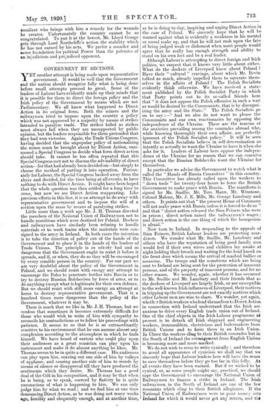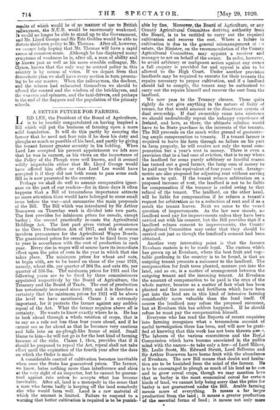GOVERNMENT BY SECTIONS.
YET another attempt is being made upon representative government. It would be well that the Government and the nation should recognize fully what is being done before small attempts proceed to great. Some of the leaders of Labour have evidently made up their minds that it is possible for them to direct the foreign policy and the Irish policy of the Government by means which are not Parliamentary. We all know what happened to Direct Action in its original form. Both the miners and the railwaymen tried to impose upon the country a policy which was not approved by a majority by means of strikes Intended to paralyse trade. The strikes failed as strikes must always fail when they are unsupported by public opinion, but the leaders responsible for them pretended that they had won victories. Again, the Trade Unions Congress, having decided that the unpopular policy of nationalising the mines must be brought about by Direct Action, sum- moned a Special Congress to decide what form direct action should take. It cannot be too often repeated that this Special Congress met not to discuss the advisability of direct action—for that had already been decided on—but simply to choose the method of putting it into operation. Fortun- ately for Labour, the Special Congress backed away from the abyss and decided, for the time being at all events, to have nothing to do with Direct Action. It might have been hoped that the whole question was then settled for a long time to come, but now we see Direct Action reappearing. Like previous efforts in this line, it is an attempt to do away with representative government and to impose the will of a section upon the mass by means of paralysing strikes. Little more than a week ago Mr. J. H. Thomas directed the members of the National Union of Railwaymen not to handle munitions which were destined for Poland. Dockers and railwaymen have similarly been refusing to handle materials or to work trains when the materials were con- signed to the army in Ireland. In both cases the intention is to take the direction of policy out of the hands of the Government and to place it in the hands of the leaders of Trade Unions. The principle is so utterly bad and so dangerous that the Government ought to resist it before it spreads, and if, or when, they do so they will be encouraged by every sensible person in the country. For our part we are very doubtful about the policy of the Government in Poland, and we should resist with energy any attempt to encourage the Poles to penetrate farther into Russia or to try to destroy Russian Bolshevism by force of arms, or to do anything except what is legitimate for their own defence. But we should resist with still more energy an attempt at home to destroy representative government. That is a hundred times more dangerous than the policy of the Government, whatever it may be.
There is much that we like in Mr. J. H. Thomas, but we confess that sometimes it becomes extremely difficult for those who would wish to write of him with sympathy to reconcile his contradictions or to follow his proceedings with patience. It seems to us that he is so extraordinarily sensitive to his environment that he can assume almost any complexion according to the atmosphere in which he finds himself. We have heard of orators who could play upon their audiences as a great musician can play upon his instrument and make it do almost anything he likes. Mr. Thomas seems to be in quite a different case. His audiences can play upon him, coaxing out one side of him by volleys of applause, and causing another side of him to recede by means of silence or disapproval till they have produced the sentiments which they desire. Mr. Thomas has a good deal of the Celt in his composition, and it may be that when he is being, so to speak, coerced by flattery he is quite unconscious of what is happening to him. We can only judge him by what we read ; and we find him at one time denouncing Direct Action, as he was doing not many weeks ago, forcibly and eloquently enough, and at another time, as he is doing to-day, inspiring and urging Direct Action in the case of Poland. We sincerely hope that he will be warned against what is evidently a weakness in his mental or moral make up, and that he will not rush upon the fate of being judged weak or dishonest when most people would agree that he really has enough strength and ability to stand on his own feet and be a real leader.
Although Labour is attempting to direct foreign and Irish politics, we suspect that it knows very little about either. What do the dockers of Liverpool know about Poland ? Have their " cultural " cravings, about which Mr. Bevin talked so much, already impelled them to saturate them- selves in the affairs of Poland ? The Polish Socialists evidently think otherwise. We have received a state- ment published by the Polish Socialist Party in which that Party points out to its so-called friends here that " it does not oppose the Polish offensive in such a way as would be desired by the Communists, that is by disorgan- izing the army and the State." The Polish Socialists go on to say :—` And we also do not want to please the Communists and our own reactionaries by opposing the independence of the Ukraine. These are the reasons of the anxieties prevailing among the comrades abroad who, while knowing thoroughly their own affairs, are perfectly ignorant of the Polish Socialist policy." It will be seen that the Polish Socialists believe in self-determination so intently as actually to want the Ukraine to have it when she asks for it. Leaders of Labour here oppose the indepen- dence of the Ukraine for no reason that we can conceive except that the Russian Bolsheviks want the Ukraine for themselves.
In particular we advise the Government to watch what is called the " Hands off Russia Committee " in this country. This Committee has already called upon the workers to " down tools " for twenty-four hours to force the British Government to make peace with Russia. The manifesto is signed by Mr. Smillie, Mr. Torn Mann, Mr. Winstone, Colonel Malone, Mr. J. E. Mills, Mr. George Lansbury and others. It points out that " the present House of Commons will not make peace with Russia unless it is forced to do so " and that " direct action released the Sinn Feiners who were in prison ; direct action raised the railwaymen's wages ; and direct action is the one thing of which the bourgeoisie is afraid."
Now turn to Ireland. In responding to the appeals of Sinn Feiners, British Labour leaders are protecting mur- derers. We wonder what Mr. Smillie, Mr. Lansbury and others who have the reputation of being good family men would feel if their own wives and children lay awake at night holding their breath and waiting for the loud knock on the front door which means the arrival of masked bullies or assassins. The troops and the munitions which are being sent to Ireland are being sent for the protection of innocent persons, and of the property of innocent persons, and for no other reason. We wonder, again, whether it has occurred to Mr. Smillie and Mr. Lansbury and their friends that as the dockers of Liverpool are largely Irish, or are susceptible to the well-known Irish influences of Liverpool, their motives in tripping up the Government are not exactly motives which other Labour men are wise to share. We wonder, yet again, whether British workers who lend themselves to Direct Action in connection with Ireland understand that the Irish are anxious to drive every English trade union out of Ireland.
One of the chief objects in the Irish Labour programme at present is to detach all Irish shipyard and engineering workers, ironmoulders, electricians and boilermakers from British Unions and to form them in an Irish Union. In Ulster the workers cling to their British comrades but in the South of Ireland the estrangement from English Unions is becoming more and more marked. We do not wish to seem to write cynically ; and therefore to avoid all appearance of cynicism we shall say that we sincerely hope that Labour leaders here will have the sense to save themselves before they go too far in this folly. At all events they have been warned. But if we wished to cynical, or, as some people might say, practical, we should urge the Government t3 encourage the National Union of Railwaymen to finance a strike in Ireland. The Irish railwaymen in the South of Ireland are one of the few remnants which cling to their British allegiance. If the National Union of Railwaymen were to pour money into Ireland for which it would never get any return, and the results of which would be of no manner of use to British railwaymen, the N.U.R. would be enormously weakened. It would no longer be able to stand up to the Government, and Mr. Lloyd George and Sir Eric Geddes would be able to dictate their own policy to Mr. Thomas. After all, however, we cannot help hoping that Mr. Thomas will have a rapid 'mess of common-sense. Although he has displayed many symptoms of weakness he is, after all, a man of ability and lye knows just as well as his more sensible colleague, Mr. dynes, knows that the only way to control policy in this country is by means of votes. If we depart from that democratic plan we shall have every section in turn presinn- hig to be our master. When the railwaymen, the dockers, and the miners had exhausted themselves we should be offered the control and the wisdom of the bricklayers, and the weavers and spinners, and the taxi-drivers, and perhaps in the end of the flappers and the population of the primary schools.







































 Previous page
Previous page